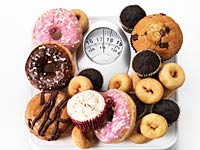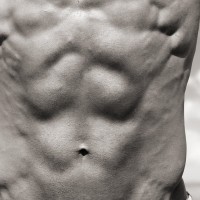Use Energy Balance to Get the Body You Want
So if weight loss is just a simple equation, then why is it so difficult to lose weight? Because there are many factors that affect both your energy input and your energy output. Things like your medical status, your age and your mood affect your energy balance equation every day.
<p>Most people don’t think of their weight loss journey as a math problem. But in many ways, it is. There is a simple equation behind every successful diet, every successful weight loss program and every get-slim-quick plan. It’s called your energy balance. And if you can get your numbers to tilt in the right direction, you’ll lose weight and get the body you want.
<p>What is Energy Balance?
<p>Energy balance is simply the relationship between your energy input and your energy output. The equation looks like this:
<p>Sounds reasonable, right? To figure out your energy balance you need to gather a few numbers.
<p>How Do I Input Energy?
<p>We input energy in the form of kilocalories, or "calories." Calories are simply a unit of energy or heat. The food we eat and the drinks we consume provide different levels of energy, or calories. Protein and carbohydrate each provide 4 calories per gram, and fat provides 9 calories per gram. More info: <a href="http://www.lidadaidaihuaslimbuy.com"><strong>lidadaidaihuaslimbuy</strong></a>
<p>One of the best ways to start a weight loss program is to determine your current level of energy input or caloric intake so that you can make adjustments to your energy balance. A typical woman may consume anywhere from 1200 to 2500 calories per day depending on her size, activity level and lifestyle factors.
<p>What is My Energy Output?
<p>Energy output happens when your body uses energy. We often refer to this as "burning” calories. Even when you’re sleeping, your body uses energy to perform basic functions like breathing and circulating blood. The rate at which your body burns calories at rest is called your basal metabolic rate (BMR). BMR makes up roughly 60-75% of the total number of calories you burn each day.
<p>You also expend energy during activities of daily living, like washing dishes or shopping, and of course, through physical exercise. These activities make up about 15-30% of your total calorie burn each day. The last 5-10% of calories are burned through the thermic effect of food, when you eat and digest meals and snacks.
<p>There are different ways to calculate the number of calories you burn each day. Many people use one or two methods to determine the most accurate number.
<p>If your energy input and your energy output are perfectly balanced, you won’t lose weight. A perfect energy balance creates a stable weight. To change your weight you need to tip the scales so that they are no longer balanced.
<p>A positive energy balance occurs when your energy input is greater than your energy output. That is, you eat more calories than your body needs. Your body stores excess energy or calories as fat. This results in weight gain.
<p>Weight loss occurs when you create a negative energy balance. That is, you burn more calories than you consume. When this imbalance occurs, your body burns stored energy in order to function and you lose weight.
<p>When you evaluate your own energy balance, it's best to get the numbers as accurate as possible. Small differences in energy input and energy output can make a big difference in your weight.
<p>Calculate Your Own Energy Balance
<p>Are you ready to calculate your own energy balance? Here are two sample equations to use as a guide.
<p>Megan has a positive energy balance of 250 calories per day. That doesn't sound like much. But over the course of a week, her estimated balance would be 1750 calories or enough to gain a half pound of weight.
<p>Carol has a negative energy balance of 250 calories. Over the course of a week, her body will need to burn 1750 calories of stored fat to meet its needs and she will lose roughly one half pound of weight.
<p>If the Math is Simple, Why is Weight Loss So Hard?
<p>So if weight loss is just a simple equation, then why is it so difficult to lose weight? Because there are many factors that affect both your energy input and your energy output. Things like your medical status, your age and your mood affect your energy balance equation every day. Weight loss is a simple equation, but finding the right balance requires a little bit more work. More info: <a href="http://www.lidadaidaihuaslimbuy.com"><strong>lida daidaihua</strong></a>
<p>If you are at the beginning of your weight loss journey, or if you are questioning your current diet and exercise plan, the energy balance equation is a perfect place to start. You don't need to buy fancy tools or invest in an expensive weight loss program. Try to make some changes on your own. Evaluate the factors that affect your caloric intake and caloric output. You have control over some factors (like activity level) and no control over others (age, gender). Simply change what you can to tilt the scales of your energy balance equation and reach your weight loss goals.
<p>What is Energy Balance?
<p>Energy balance is simply the relationship between your energy input and your energy output. The equation looks like this:
<p>Sounds reasonable, right? To figure out your energy balance you need to gather a few numbers.
<p>How Do I Input Energy?
<p>We input energy in the form of kilocalories, or "calories." Calories are simply a unit of energy or heat. The food we eat and the drinks we consume provide different levels of energy, or calories. Protein and carbohydrate each provide 4 calories per gram, and fat provides 9 calories per gram. More info: <a href="http://www.lidadaidaihuaslimbuy.com"><strong>lidadaidaihuaslimbuy</strong></a>
<p>One of the best ways to start a weight loss program is to determine your current level of energy input or caloric intake so that you can make adjustments to your energy balance. A typical woman may consume anywhere from 1200 to 2500 calories per day depending on her size, activity level and lifestyle factors.
<p>What is My Energy Output?
<p>Energy output happens when your body uses energy. We often refer to this as "burning” calories. Even when you’re sleeping, your body uses energy to perform basic functions like breathing and circulating blood. The rate at which your body burns calories at rest is called your basal metabolic rate (BMR). BMR makes up roughly 60-75% of the total number of calories you burn each day.
<p>You also expend energy during activities of daily living, like washing dishes or shopping, and of course, through physical exercise. These activities make up about 15-30% of your total calorie burn each day. The last 5-10% of calories are burned through the thermic effect of food, when you eat and digest meals and snacks.
<p>There are different ways to calculate the number of calories you burn each day. Many people use one or two methods to determine the most accurate number.
<p>If your energy input and your energy output are perfectly balanced, you won’t lose weight. A perfect energy balance creates a stable weight. To change your weight you need to tip the scales so that they are no longer balanced.
<p>A positive energy balance occurs when your energy input is greater than your energy output. That is, you eat more calories than your body needs. Your body stores excess energy or calories as fat. This results in weight gain.
<p>Weight loss occurs when you create a negative energy balance. That is, you burn more calories than you consume. When this imbalance occurs, your body burns stored energy in order to function and you lose weight.
<p>When you evaluate your own energy balance, it's best to get the numbers as accurate as possible. Small differences in energy input and energy output can make a big difference in your weight.
<p>Calculate Your Own Energy Balance
<p>Are you ready to calculate your own energy balance? Here are two sample equations to use as a guide.
<p>Megan has a positive energy balance of 250 calories per day. That doesn't sound like much. But over the course of a week, her estimated balance would be 1750 calories or enough to gain a half pound of weight.
<p>Carol has a negative energy balance of 250 calories. Over the course of a week, her body will need to burn 1750 calories of stored fat to meet its needs and she will lose roughly one half pound of weight.
<p>If the Math is Simple, Why is Weight Loss So Hard?
<p>So if weight loss is just a simple equation, then why is it so difficult to lose weight? Because there are many factors that affect both your energy input and your energy output. Things like your medical status, your age and your mood affect your energy balance equation every day. Weight loss is a simple equation, but finding the right balance requires a little bit more work. More info: <a href="http://www.lidadaidaihuaslimbuy.com"><strong>lida daidaihua</strong></a>
<p>If you are at the beginning of your weight loss journey, or if you are questioning your current diet and exercise plan, the energy balance equation is a perfect place to start. You don't need to buy fancy tools or invest in an expensive weight loss program. Try to make some changes on your own. Evaluate the factors that affect your caloric intake and caloric output. You have control over some factors (like activity level) and no control over others (age, gender). Simply change what you can to tilt the scales of your energy balance equation and reach your weight loss goals.
Related Articles
-
Shrink Stomach Fat FAST- The Best Diet Plan to Shrink Your Midsection Quickly & EASILY!
Do you want to shrink stomach fat once and for all? Listen, take just
-
Laser Treatment for Cellulite: the Jurys Still Out
First off, if you are a man and have cellulite, dont bother with laser
-
In And Out Of Pregnancy With Easy And Quick Preg-weight Loss
I wrote this article because I am sure youd like to avoid gaining weig
-
Weight Loss using Hypnosis CDs and MP3s
Weight loss is the common problem for most people. People t
-
Is It Time for a Weight Loss Coach?
If you had a health problem, you would enlist the assistanc
-
Beauty Is Somewhere Between
The evergreen topic during the last 30 years; overweight. No end o
- DON'T MISS
- Raspberry Ketone Plus - Subtracting The Fat In Your Body
- Herbal Fat Loss Remedies To Reduce Weight Gain After Pregnancy
- Gastric Band is a One Stop Shop for Losing Weight
- Lose Weight Rapidly
- How to Lose Fat - Exercise and Shed the Excess Pounds Super Fast
- How Effective is Green Tea in Natural Weight Loss?
- XENICAL is use for weight reduction and weight maintenance
- Fat Burning Furnace - Healthy Fat Weight Loss Workouts that Will Make You Throw Out Your Treadmill!
- Lose a stone in a month
- Fat Burning Furnace Book Download Free




